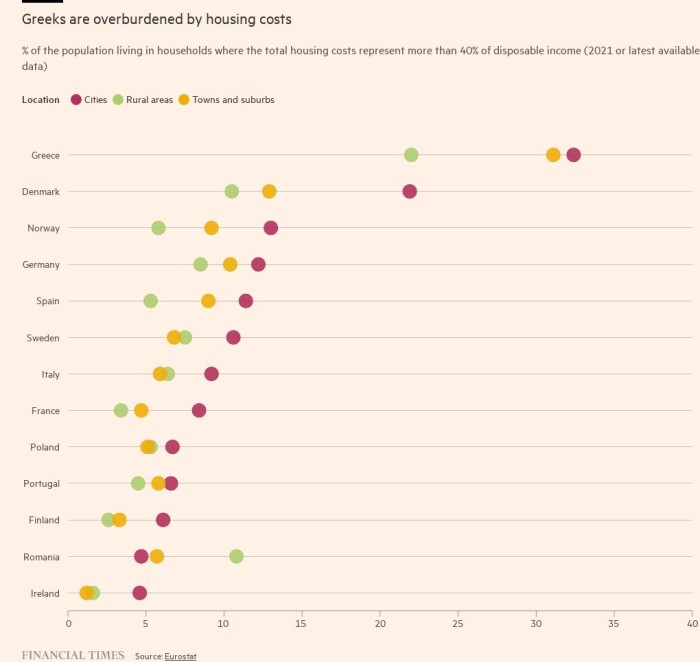Cheap loans to give young Greeks a chance to have their own home
Katerina Giousi had given up buying a home. “It was just unthinkable,” said the 29-year-old hairstylist, recently married with a 10-month-old son, from the beauty salon in central Athens where she has worked for six years.
Greece The seven-year housing boom has left many young people in the same situation, locked out of the housing market and forced to cover the cost of soaring rents despite little increases in their real incomes. A spike in borrowing costs after the European Central Bank raised interest rates by two percentage points in three meetings only made the problem worse.
That could soon change, however, after the Greek government unveiled a €1.75 billion affordable housing project that will put home ownership within reach for Giousi and thousands of people like her by offering ultra-cheap loans to finance real estate purchases.
As borrowing costs soar across Europe, Greece is the latest country to offer relief to people struggling to get on – or stay – on the property ladder. Madrid has unveiled a package of measures to ease the burden on vulnerable homeowners, many of whom are tied to variable-rate mortgages, which move closely with increases in interest rates. Warsaw stepped in to protect borrowers whose mortgages were denominated in Swiss francs, following the depreciation of the zloty. Ireland, meanwhile, has eased loan conditions for first-time buyers.
The scale of the crisis facing young Greeks is so great – a June poll by Athens-based think tank Eteron showed that 47.9% of people aged 18-44 had difficulties or were unable to pay their rent – that managing it became a challenge. priority for the centre-right government of Kyriakos Mitsotakis, which faces elections next year.
From the start of 2023, banks will provide €500m in mortgages at a quarter of the market rate to around 10,000 low-income people aged 25-39 using €375m in interest-free loans of the government. This means that this group will be able to borrow, at least initially, at around 1%.
“Without the cheap mortgage it would be impossible for us,” said Giousi, who began a property search near her home in Haidari, a densely populated suburb west of Athens.
“The reality is that housing costs eat into your income. This was not the case in the past, and we had to create different tools to cover different needs,” said Akis Skertsos, Minister of State and designer of the program.
The proportion of Greeks expenses more than 40 percent of their disposable income on housing is well above the EU average.

However, the OECD recently warned that the package will simply drive up housing costs in the longer term. “International experience suggests that the new tax subsidy for interest charges on home loans can increase house prices when new supply is limited, with the effect of reducing home ownership,” said the Paris-based organization. said last month.
Bankers played down concerns. “Property prices will hardly be distorted as the scheme is expected to apply to around 10,000 people,” Eurobank chief executive Fokion Karavias said.
However, Nikos Vettas, chief executive of IOBE, an Athens-based economic think tank, said that while the measures were a step in “the right direction”, housing would remain unaffordable as long as wages remained low.
The government package also aims to address a housing shortage, using much of the remaining €1.375 billion in funds to renovate old apartments for students and low-wage earners. The government also plans to move civil servants from 177 of its offices in central Athens to the suburbs over the next five years, increasing the availability of space in the city center.
“[The package] will not only provide an opportunity for young people to become homeowners, but will also provide an incentive to modernize an aging real estate market,” said Karavias.
Skertsos said the government would double funding if demand exceeds supply. Legislation authorizing the aid is expected to be passed by the end of the month, while banks are expected to open applications almost immediately.
Since Greece emerged from its debt crisis, residential real estate prices have soared. “House prices have risen 30% while rents have risen 50% over the past seven years,” said Dimitris Melachrinos, chief executive of Spitogatos, the largest online real estate platform, which has more than 500 000 ads.
The rapid increase was partly attributed to the growth of Airbnb and similar short-term rental platforms. Greek cities have far more Airbnb rentals listed as whole homes than cities like Amsterdam and Dublin, indicating the company is having a more drastic impact on reducing housing availability for locals than elsewhere.

In Koukaki and Plaka, two neighborhoods close to the Acropolis, old buildings have been renovated and turned into boutique hotels, while former residents, including students and young couples, have been replaced by tourists. Taxis and minivans roam the streets, waiting for visitors, while keys have been replaced with codes on exterior doors and luggage wheels wandering on sidewalks are part of the soundtrack.
“It turned my neighborhood into a tourist block,” said lifelong Plaka resident Constantinos Sofikitis. “We have become the dirty backyard of the Parthenon.”
Another factor driving up prices was the golden visa program, which granted a five-year residency permit to third-country nationals provided they purchased real estate worth at least 250,000 €. Many properties have been purchased at double or even triple their market value, according to research by Eteron. A doubling of the qualification threshold to €500,000 from next year will add to the bubble, according to Eteron researcher Alkis Kafetzis.
Germans are the main foreign buyers, followed by Americans and Britons, Melachrinos said. “With high global inflation, people are looking to real estate as a safe investment, and Greece is still a relatively cheap market compared to other European countries. But not the Greeks.
Graphics by Federica Cocco


Comments are closed.